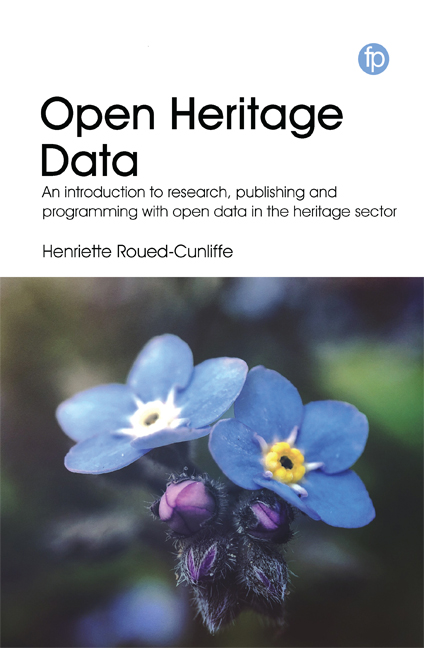 Open Heritage Data
Open Heritage Data Book contents
- Frontmatter
- Dedication
- Contents
- List of Case Studies, Figures and Tables
- List of Abbreviations
- Acknowledgements
- Preface
- Introduction
- 1 Openness in Heritage
- 2 Sharing Legally
- 3 Publishing Open Data
- 4 Using and Reusing Open Data
- 5 Visualising Open Data
- 6 Combining Open Data
- 7 Open Data for Research
- Appendix A Examples Used in the Book
- Appendix B Introduction to Coding
- References
- Index
7 - Open Data for Research
Published online by Cambridge University Press: 23 July 2020
- Frontmatter
- Dedication
- Contents
- List of Case Studies, Figures and Tables
- List of Abbreviations
- Acknowledgements
- Preface
- Introduction
- 1 Openness in Heritage
- 2 Sharing Legally
- 3 Publishing Open Data
- 4 Using and Reusing Open Data
- 5 Visualising Open Data
- 6 Combining Open Data
- 7 Open Data for Research
- Appendix A Examples Used in the Book
- Appendix B Introduction to Coding
- References
- Index
Summary
Data science is making its way into the humanities, slowly but surely. Some researchers have been working with heritage datasets for a while but, overall, adoption of analysis based on more structured datasets has been slow in the arts and humanities. As with heritage institutions, it is often due to a lack of skill and perhaps a propensity to theorise about data rather than delve into datasets themselves.
While open data can serve as a means to engage and create new narratives of heritage among the public, it also has a large role to play in research. Today some funding agencies encourage open datasets as a part of the projects they fund, alongside open access publication. An example of this is the EU's Horizon 2020 programme, which encourages open access to research data, although optouts are possible. It is guided by the principle of ‘as open as possible, as closed as necessary’ (European Commission, 2019). In some research subjects the publication of datasets alongside research publications plays an important role in order to allow other researchers to replicate studies. We do not have a tradition of this in the heritage field. However, as more research comes to be based on larger datasets this will, hopefully, become an important part of research publication. Further, access to open heritage datasets will enable researchers to try out these methods on even more datasets.
An example of this is the project Six Degrees of Francis Bacon, which is a digital reconstruction of an early modern social network. The dataset is visualised on the website in such a way that it can be explored by any researcher or student. Further, the dataset and visualisations are licensed under a CC BY-NC-SA licence, allowing anyone to use them for any noncommercial purpose. This is a step forward, but at the same time not enough, as the use of non-commercial licences is not fully open (see Chapter 2).
This chapter will show an example of using open datasets for research purposes. While the use of these methods in the humanities has become more common over the years, applying them to open heritage datasets is still in its infancy generally.
- Type
- Chapter
- Information
- Open Heritage DataAn Introduction to Research, Publishing and Programming with Open Data in the Heritage Sector, pp. 113 - 124Publisher: FacetPrint publication year: 2019


